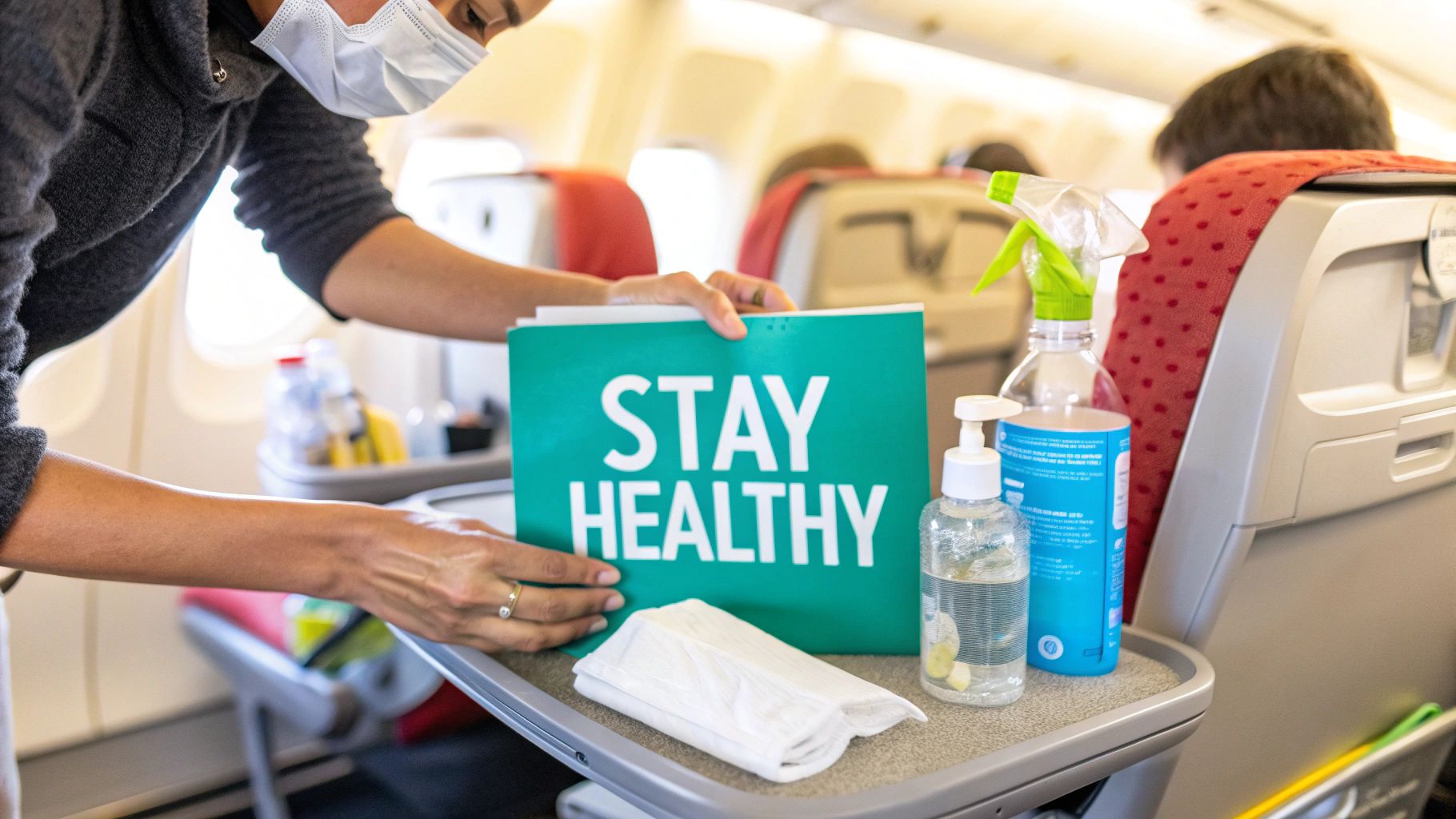

· By Annemarie
How to Avoid Getting Sick While Traveling
Let’s be honest, the last thing you want to bring home from a fantastic trip is a nasty bug. The secret to staying healthy on the road isn’t about luck; it starts with a solid game plan long before you even think about packing.
Your best defense is a good offense. This means taking proactive steps—like visiting your doctor and building a custom health kit—to make sure your adventure is memorable for all the right reasons.
Your Pre-Travel Health Game Plan
A healthy trip isn't something that just happens. It’s planned weeks, sometimes even months, before you leave. It's about shifting your mindset from "I hope I don't get sick" to "Here's exactly how I'm going to stay healthy." This all starts with knowing what you're walking into at your destination.
First things first: schedule a visit with your doctor or a travel medicine specialist at least 4-6 weeks before you go. This isn't just a routine check-up. Think of it as a strategy session. Show up with your full itinerary—every city, rural area, and even activities like hiking or swimming you have planned.
The Doctor Dialogue And Vaccination Strategy
You’re looking for more than just generic advice here. A good chat with your doctor should cover a few key things:
- Required vs. Recommended Vaccinations: Some countries won't let you in without proof of certain vaccinations (like Yellow Fever). For other destinations, vaccines for things like Typhoid or Hepatitis A are just a really, really good idea.
- Prescription Medications: Make sure you have enough of any personal prescriptions to last your entire trip, plus a little extra for unexpected delays. This is also the time to ask about preventative meds for things like malaria or the dreaded traveler's diarrhea.
- Your Personal Health History: Don't be shy. Be upfront about any chronic conditions or allergies you have. This is how your doctor can give you advice that’s actually meant for you.
A classic rookie mistake is waiting until the last minute. Some vaccines need multiple shots spaced weeks apart, or they just take time to kick in and become fully effective. Seriously, plan ahead. It’s a non-negotiable for proper immunization.
Assembling a Personalized Travel Health Kit
Forget those pre-made, one-size-fits-all first-aid kits from the drugstore. A truly useful health kit is one you customize yourself. Start with the basics—band-aids, antiseptic wipes, and pain relievers—but then build it out from there.
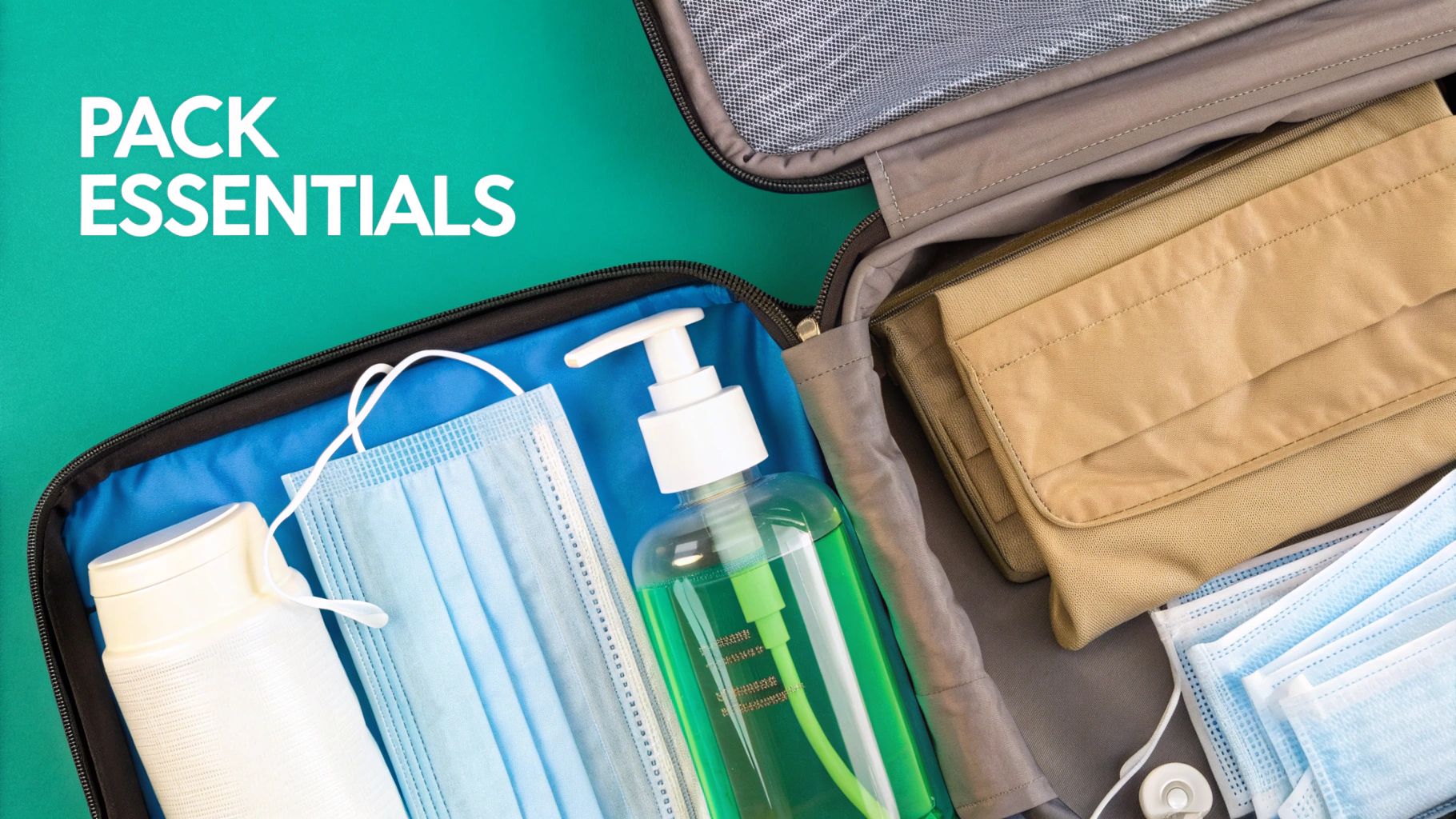
Think about adding:
- Stomach Soothers: Meds for diarrhea, indigestion, and motion sickness are absolute must-haves. You’ll thank yourself later.
- Allergy Relief: Pack antihistamines, even if you don't think you have allergies. You never know what new plants or foods you'll encounter.
- Skin Protection: This means a good insect repellent (especially for tropical spots), hydrocortisone cream for surprise bites or rashes, and some aloe vera for that inevitable sunburn.
When you build your own kit, you know exactly what’s in it and how to use everything. For more tips, our other guides offer tons of advice on how to stay healthy while traveling with a focus on day-to-day habits.
Interpreting Travel Advisories for Health Risks
Official government travel warnings are your friend. The U.S. Department of State, for example, is constantly updating advisories for health and safety risks. A country like Thailand might have a Level 1 or 2 advisory, just asking you to be cautious. But another destination could have a Level 4 'Do Not Travel' warning because of serious health crises or other dangers.
Ignoring these warnings or reports of local disease outbreaks is a gamble you don't want to take. Do your homework. Before you finalize anything, you should review official travel advisories before your trip. This kind of proactive research helps you make smart calls, like maybe skipping a region that just had a cholera outbreak.
Mastering Hygiene in Transit and Beyond
Your trip really starts the second you walk out the front door—and so does your dance with a whole new world of germs. Let's be real: airports, train stations, and rental cars are petri dishes. Mastering your on-the-go hygiene isn't about being paranoid; it's about building smart, consistent habits that act as your personal shield against those pesky travel bugs.
Think about it. Your hands are your main tool for interacting with the world. They push elevator buttons, pull open doors, and grip handrails. Unfortunately, that also makes them the number one way germs get from a surface to your face. This makes hand hygiene your absolute first line of defense.
The Great Hand Hygiene Debate
So, when do you reach for the sanitizer, and when do you hunt down a sink?
An alcohol-based hand sanitizer (make sure it's at least 60% alcohol) is a traveler's best friend for pure convenience. It's perfect after you've tapped a kiosk screen, grabbed your bag off the carousel, or used an ATM. When soap and water are nowhere in sight, it's a quick way to neutralize most pathogens.
But sanitizer isn't a magic bullet. It struggles with visibly dirty or greasy hands and won't kill stubborn germs like norovirus. For that, you need the classic one-two punch of soap and water. A solid, 20-second scrub is a must after using the restroom, before you eat, and anytime you cough or sneeze.
An eye-opening study from Aston University found that airplane tray tables can host up to eight times more bacteria than the lavatory flush button. It’s a jarring reminder that the surfaces we think are clean are often the ones we need to worry about most.
This simple visual breaks down the key health prep you should tackle before your trip, setting a solid foundation for staying well on the road.
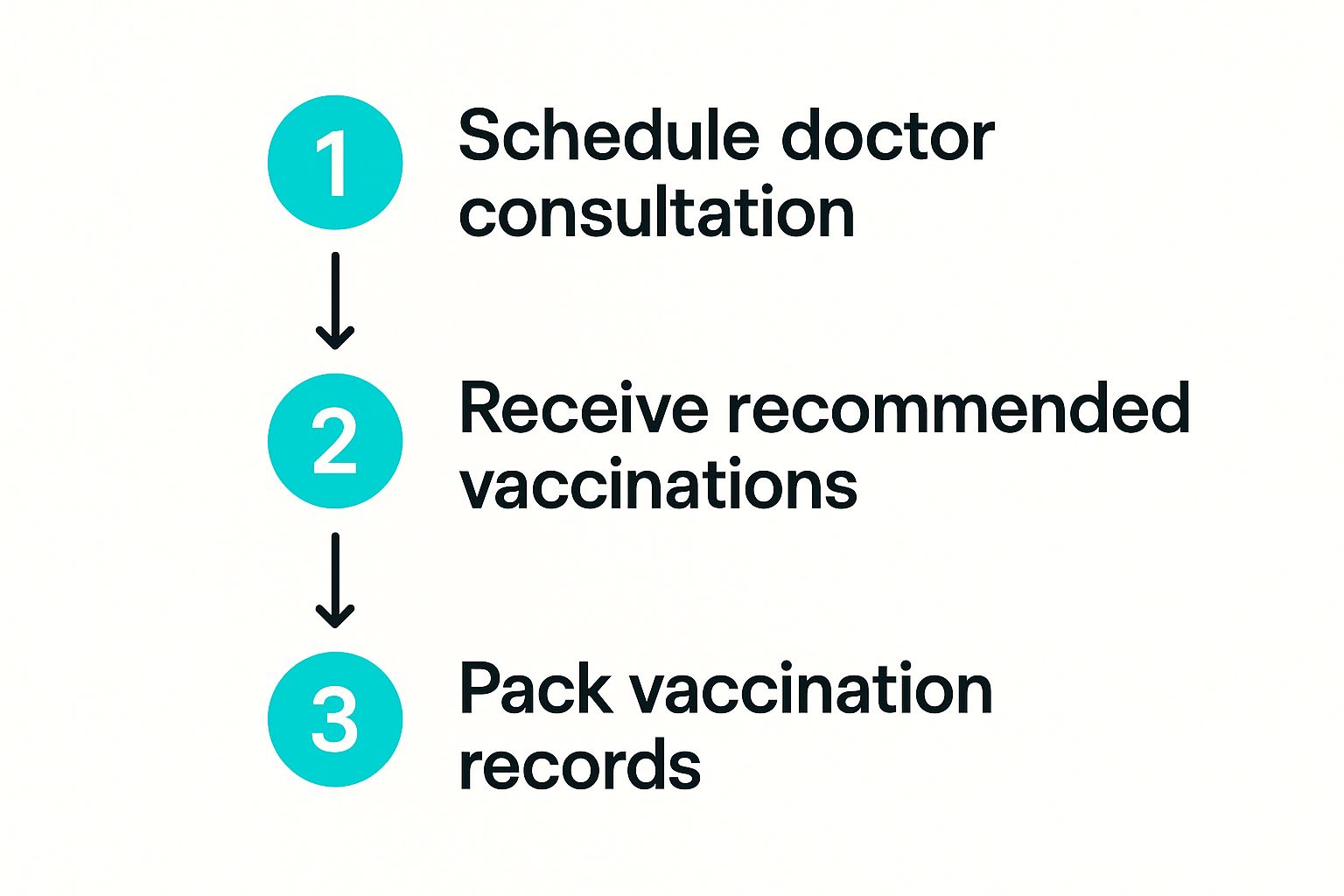
As you can see, a little proactive effort—from checking in with your doctor to getting your documents in order—goes a long way in making your travels safer and more enjoyable.
To help you remember what to do and when, here’s a quick-reference guide.
Traveler's Hygiene Action Plan
| Situation | Recommended Action | Key Surfaces to Clean | Pro Tip |
|---|---|---|---|
| On a Plane/Train | Disinfectant wipes, then hand sanitizer. | Tray table, armrests, seatbelt buckle, entertainment screen, air vent. | Wipe down your area before settling in. Don't wait until you need to use something. |
| Before a Meal | Soap and water (20-second scrub). | Your hands are the priority here. | If no sink is available, use sanitizer but be thorough. Let it dry completely. |
| After Using ATM/Kiosk | Hand sanitizer (at least 60% alcohol). | N/A | Sanitize immediately after touching any public high-touch screen or keypad. |
| In a Hotel Room | Disinfectant wipes. | TV remote, light switches, doorknobs, phone, bathroom faucets. | Do a quick "wipe-down" sweep as soon as you check in for peace of mind. |
| After Bathroom Use | Soap and water (always). | N/A | Sanitizer is not a substitute for washing hands after using the restroom. |
This table simplifies your hygiene strategy, ensuring you're using the right tool for the job to keep germs at bay.
Creating Your Personal Clean Zone
The moment I find my seat on a plane or train, I start what I call my "wipe-down ritual." Before I even think about stowing my bag or getting comfortable, I pull out a pack of disinfectant wipes. This little two-minute routine can drastically cut down your exposure to whatever the last passenger left behind.
Here’s my personal hit list. I never skip these:
- The Tray Table: Both the top surface and the latch.
- The Armrests: And don't forget the recline button!
- The Seatbelt Buckle: Literally everyone touches this.
- Air Vent & Light Controls: So easy to overlook, but so frequently touched.
- In-flight Entertainment Screen & Remote: A certified germ hotspot.
This ritual doesn't stop when I land. The first things I wipe down in my hotel room are the TV remote, light switches, doorknobs, and the phone. It’s a tiny bit of effort that gives me huge peace of mind.
And don't forget your own stuff! Your phone, for instance, touches countless questionable surfaces all day and then goes right up to your face. Wiping it down daily is a simple but brilliant habit. Taking these small, consistent actions is a key part of the strategy for how to avoid getting sick while traveling, letting you focus on the fun, not the flu.
How to Eat and Drink Safely Abroad
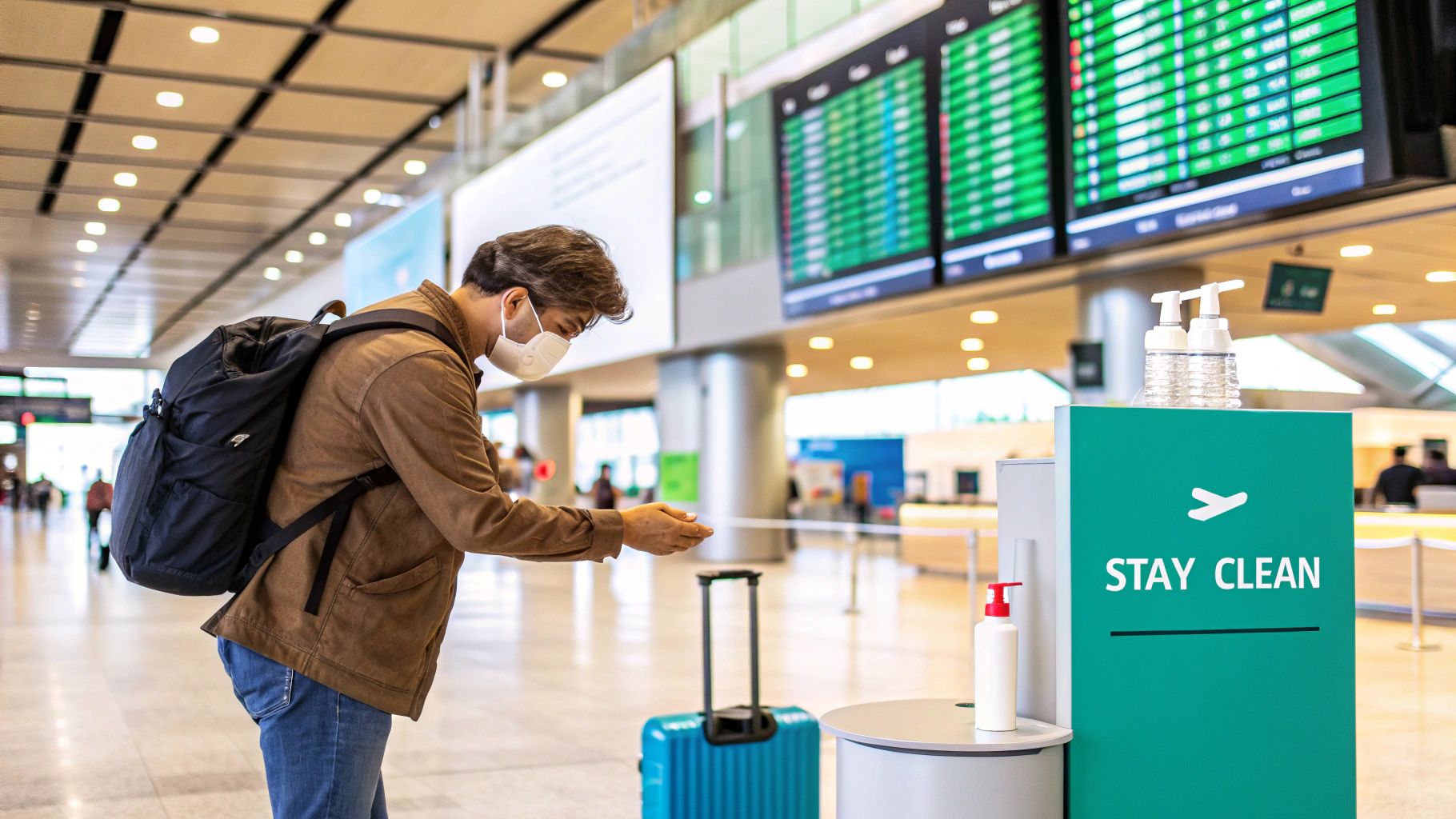
Let's be real, trying new food is one of the best parts of traveling. But nothing tanks a vacation faster than getting hit with a nasty stomach bug from something you ate or drank. Learning how to navigate local cuisine safely isn’t about making a long list of "forbidden" foods. It's about developing smart habits so you can dive into the local flavors without a second thought.
The biggest offender behind most traveler’s tummy troubles? Contaminated water. Even if you see locals chugging it straight from the tap, your gut isn't used to the same microscopic critters. This one fact should be your north star for almost every decision you make about food and drink on your trip.
Navigating Water Safety and Beverages
My number one rule for water is simple: if you have any doubt, don't drink it from the tap. In many places around the globe, the water just isn't treated to the same standards you might be used to back home, making it a major risk.
Stick to factory-sealed bottled water and always give the cap a quick check to make sure the seal is intact. If you want a more eco-friendly approach, a portable water filter or a UV sterilizing pen is a game-changer for purifying tap water wherever you are.
But it’s not just about the water you drink. Think about all the sneaky ways water gets into your system:
- Ice Cubes: This is a big one. Unless you can personally confirm the ice is made from filtered or boiled water (which many upscale hotels and restaurants do), it’s just safer to ask for your drinks "no ice."
- Brushing Your Teeth: It's pure muscle memory to rinse your mouth with tap water, but that's an easy way to get sick. I always use bottled or purified water to rinse my brush and my mouth. It feels weird at first, but it works.
- Free Restaurant Drinks: That pitcher of iced tea or juice on the table can look mighty tempting. But if the restaurant can't confirm they use purified water, I’ll always go for a canned soda or bottled drink instead.
I had my absolute worst travel sickness experience from a "free" iced tea in Colombia. I totally broke my own rule, and I paid for it for days. It was a miserable but powerful lesson: even the smallest choices can make or break your health on the road.
Making Smart Food Choices
You've probably heard the old saying: "boil it, cook it, peel it, or forget it." It’s famous for a reason—it’s solid advice. Sticking to this simple mantra will dramatically cut your risk of eating something contaminated.
Hot, freshly cooked food is almost always your safest bet because high heat kills off most of the bad stuff. Street food can be an incredible experience, but you have to know what to look for.
Vet Street Food Stalls Like a Pro
- Follow the Crowd: A long line of locals is the best Yelp review you could ask for. It means the food is not only good but also trusted. Plus, high turnover means fresher ingredients.
- Watch the Cook: Can you see the kitchen? Look for clean surfaces and good hygiene. Are they handling money and then food with the same hands? Or are they using gloves?
- Prioritize "Cooked to Order": Go for the food that’s cooked fresh, right in front of you. Anything that's been sitting in a warmer for who-knows-how-long is a gamble.
When it comes to produce, be super careful with anything that might have been washed in tap water and served raw. That beautiful salad? Probably a risky move. Fruits you can peel yourself, like bananas and oranges, are fantastic. Anything with a thin skin you eat, like grapes or berries, should be washed really well with purified water—or just skipped.
The need for this kind of caution is real. There's been a 26% surge in illness-related travel disruptions recently, showing just how quickly sickness can derail a trip. Doing your homework on a destination's health risks and knowing where local clinics are is a must. And in a pinch, new tech like AI-powered language tools can be a huge help, translating medical info to get you care faster. You can find more tips on how modern prep and tech are making travel safer and learn more about recent travel safety trends.
Fortifying Your Immune System for Travel
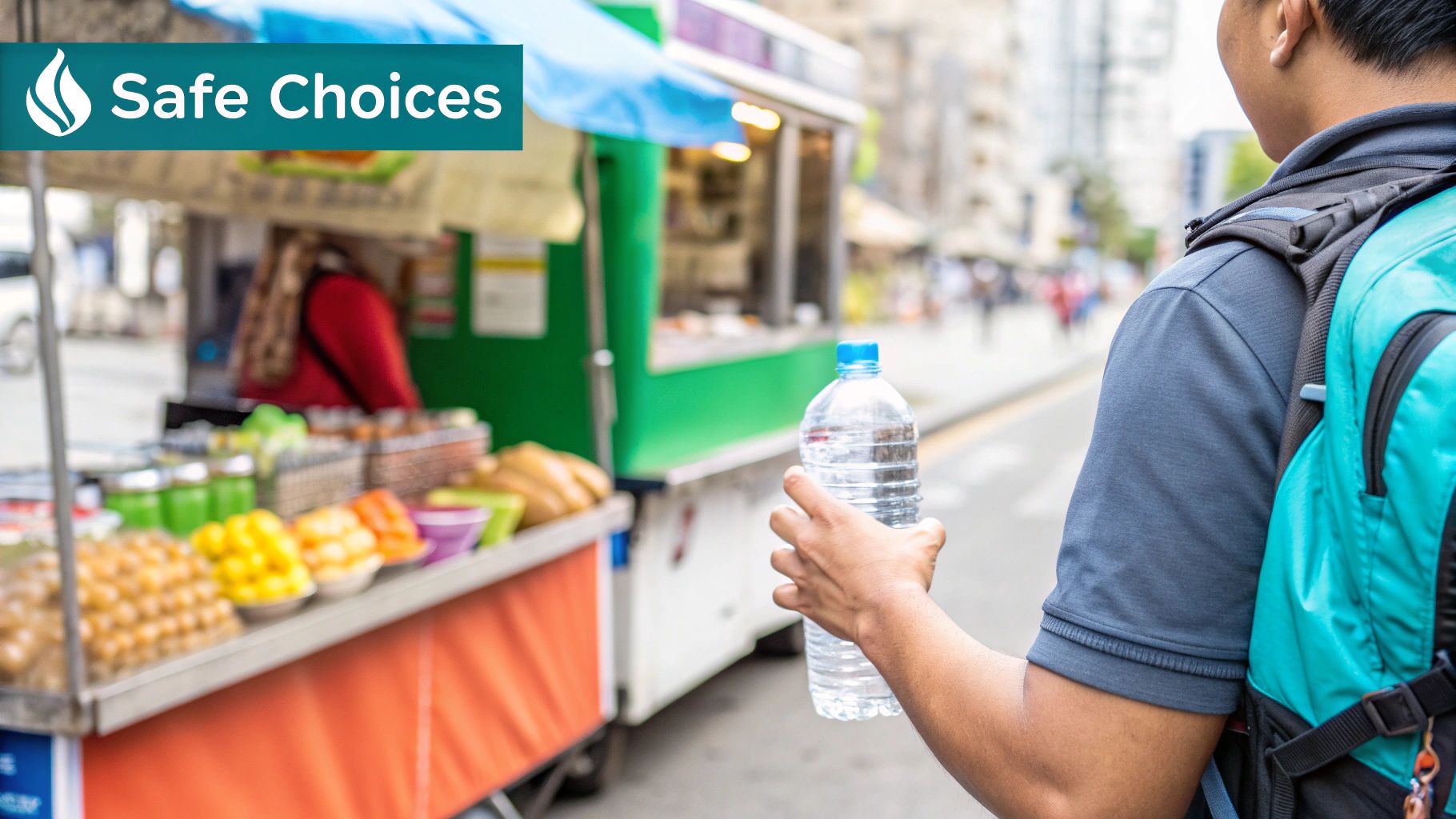
While wiping down your tray table and being smart about street food are great lines of defense, what’s happening inside your body is just as important. Your immune system is your personal, 24/7 security detail, and travel puts it under some serious stress. Giving it a boost before and during your trip is one of the best things you can do to sidestep that dreaded vacation cold.
Think of your immune system like a muscle. When it's rested, fed, and hydrated, it's strong. But when it's overworked and running on fumes, it gets weak and leaves you wide open to all the new germs you're bound to meet. The mission is to give your body everything it needs to fend off whatever comes its way.
Prioritize Quality Sleep and Conquer Jet Lag
Never, ever underestimate the power of a good night's sleep. Study after study shows that skimping on quality rest tanks your immune function, making you way more likely to catch a cold. When you're sleep-deprived, your body just doesn't produce enough of the crucial infection-fighting cells and proteins (called cytokines) it needs.
Of course, the big challenge here is jet lag. Hopping across time zones can completely scramble your internal body clock, or circadian rhythm.
To fight back, try a few things:
- Ease into it: A few days before your flight, start shifting your bedtime and wake-up calls an hour or so closer to your destination's time.
- Chase the sun: As soon as you land, get outside into natural daylight. Sunlight is the most powerful signal you can send your body to reset its clock.
- Ditch the evening screens: In the hours before bed, dim the lights and put your phone away. The blue light from our devices messes with melatonin, the hormone that signals "it's time to sleep."
So many travelers make the mistake of chugging coffee to power through the exhaustion. A cup might give you a short-term kick, but it can wreck your sleep schedule later, starting a vicious cycle of fatigue that just hammers your immune system.
Hydration Is More Than Just Quenching Thirst
You know that dry, scratchy feeling you get on a plane? That’s because airplane cabins are ridiculously dry, with humidity levels that can plummet to 10-20%. This desert-like air dehydrates the mucous membranes in your nose and throat—a critical part of your body's first defense against airborne viruses.
Staying hydrated keeps these barriers moist and working properly. Don't wait until you feel thirsty; at that point, you're already behind. Make it a goal to sip water consistently throughout your entire flight.
On really long travel days, though, water might not be enough. You're also losing key electrolytes. This is where electrolyte powders or hangover sticks come in clutch, even if you haven’t had a single drink. They restock essential minerals like sodium and potassium, helping your body rehydrate way more effectively and recover from the physical toll of travel.
Strategic Supplementation for Immune Support
Supplements aren't a magic bullet, but they can give your system a much-needed edge when it's under pressure. Instead of just grabbing a generic multivitamin, it's better to focus on a few key players known for helping out your immune system.
- Vitamin C: An absolute classic. This antioxidant is essential for your white blood cells to do their job. Your body doesn't store it, so you need a steady daily intake. I usually start taking a supplement a week before I travel and keep it up throughout the trip.
- Zinc: This mineral is vital for your immune cells to develop and communicate. Some studies even suggest that taking zinc as soon as you feel a sniffle coming on can help shorten a cold.
- Probiotics: It might sound wild, but roughly 70% of your immune system lives in your gut. A daily probiotic helps keep your gut bacteria happy and balanced, which can easily get thrown out of whack by travel stress and new foods.
For a deeper dive into staying well on your adventures, check out our guide full of more travel health tips. By pulling all these strategies together—sleep, hydration, and smart supplements—you're giving your body a rock-solid foundation to stay healthy, no matter where you're headed next.
Adapting to Your Environment to Stay Well
Okay, so we’ve covered personal hygiene, but staying healthy on the road is just as much about reading the room—or the entire city—as it is about hand sanitizer. It’s a skill you develop over time: being an observant, flexible traveler who can look at a situation and know when to pivot.
This means being willing to ditch your perfectly planned itinerary at a moment's notice. For example, if you hear chatter about a sudden flu outbreak, maybe swap that crowded indoor museum for a stroll through a spacious park or an open-air market. A flexible mindset is your best defense against the unexpected.
Stay Informed in Real Time
Checking travel advisories before you leave is a great start, but things on the ground can change in a heartbeat. Once you've arrived, you need to keep your finger on the pulse of what's happening locally.
Here’s how I do it:
- Local News Outlets: I always look up the local English-language newspapers or TV station websites. They’re usually the first to report on public health issues, like a spike in infections or food safety warnings.
- Hotel Concierge or Staff: These people are goldmines of local info. They can give you the real scoop on which areas to avoid or if there are any health concerns bubbling up. Don't be shy—just ask.
- Social Media and Expat Groups: Following local health authorities on social media or joining a city's expat forum can give you unfiltered, real-time updates from people who are actually there.
This kind of awareness also helps you understand bigger travel trends. For instance, recent data shows a 5% increase in last-minute bookings, suggesting travelers are becoming more reactive to global health situations. It's a complex picture, but knowing these things helps you gauge potential risks. You can get a deeper look into how global booking trends reflect travel health concerns at OAG.com.
A Critical Safety Net: Travel Insurance No matter how much you plan, things can go sideways. This is why good travel insurance with solid medical coverage isn't just nice to have—it's non-negotiable. It’s not about lost luggage; it’s your lifeline if you get seriously sick or hurt. Make absolutely sure your policy covers medical evacuation. Trust me, you do not want to see that bill otherwise.
Adaptability Is Your Superpower
Being adaptable means you’re ready to change course to protect your health. Of course, that's a lot easier said than done when you're exhausted from crossing time zones.
Jet lag is the ultimate enemy of good decision-making. It clouds your judgment and hammers your immune system, making it harder to be observant and resilient. If you're struggling to adjust, it’s worth tackling it head-on. Our guide on natural remedies for jet lag has some proven tips to help you stay sharp and ready for anything.
Ultimately, it’s about being proactive, not reactive. When you stay informed, you can see potential problems coming and sidestep them before you walk into a bad situation. This isn't about traveling in fear; it's about traveling with confidence. Knowing you can change your plans based on new information is what separates a smart, healthy traveler from someone who just crosses their fingers and hopes for the best.
Got a Question? We’ve Got Answers.
Even the most seasoned travelers run into tricky situations on the road. It’s one thing to pack your bags, but another to navigate the little health questions that pop up mid-adventure. So, let’s tackle some of the most common ones I hear.
Think of this as your quick-reference guide for handling those "what if" moments with confidence.
Should I Take Probiotics Before a Trip?
Absolutely. I think this is one of the smartest pre-travel moves you can make. Kicking off a round of probiotics a week or two before you fly out can really shore up your gut health. A happy gut is your best defense against unfamiliar foods and potential bugs that can lead to the dreaded traveler's diarrhea.
Just be sure to grab a high-quality probiotic. You'll want one with well-studied strains like Lactobacillus and Saccharomyces boulardii, which are known troopers when it comes to digestive support. As always, it's a good idea to run it by your doctor before starting any new supplement, just to make sure it’s a good fit for you.
Your gut is your travel superpower. Since about 70% of your immune system is right there, keeping it in fighting shape is probably the single best thing you can do to stay healthy on your trip.
Is It Safe to Eat Salad Abroad?
This one is a classic, and the answer is always: it depends on where you are. In a country with high water purification standards (think Western Europe or Japan), you're generally in the clear at reputable spots.
But in many parts of the world, that raw salad is a gamble I wouldn't take. Why? Because those leafy greens are likely washed in local tap water, which could be teeming with bacteria or parasites your system has never met. When you're unsure, just fall back on the traveler's golden rule: "Boil it, cook it, peel it, or forget it."
Here's how I think about it:
- Safe Bet: Fruits you peel yourself. Bananas, oranges, mangoes—go for it.
- Use Caution: Things with thin skins like grapes or berries that need a good wash.
- High Risk: Leafy green salads, pre-sliced fruit platters, and any raw veggie garnishes. Just skip 'em.
What Do I Do If I Start Feeling Sick?
First things first: stop. Don’t try to power through your itinerary. Your health is way more important. The second you feel that first wave of "uh-oh," get back to your hotel, focus on rest, and start chugging bottled or purified water. You need to give your body a real chance to fight back.
This is exactly why you packed that little personalized health kit. For a minor headache or a slightly upset stomach, it has everything you need.
Now, if symptoms get serious—like a high fever, or you can't keep anything down—or if you’re not feeling better after 24 to 48 hours, it’s time to call a doctor. Don't be a hero. Your travel insurance provider is your best friend here; they can point you to a good, English-speaking clinic. Trying to "tough it out" is how a minor bug turns into a major problem, especially when you're far from home. Your recovery comes first, always.
Travel should be about making amazing memories, not worrying about the morning after. Upside makes it easy to stay on top of your game. Our hangover sticks are packed with natural, effective ingredients to help you feel great, so you can enjoy your nights out and still conquer your travel days.
